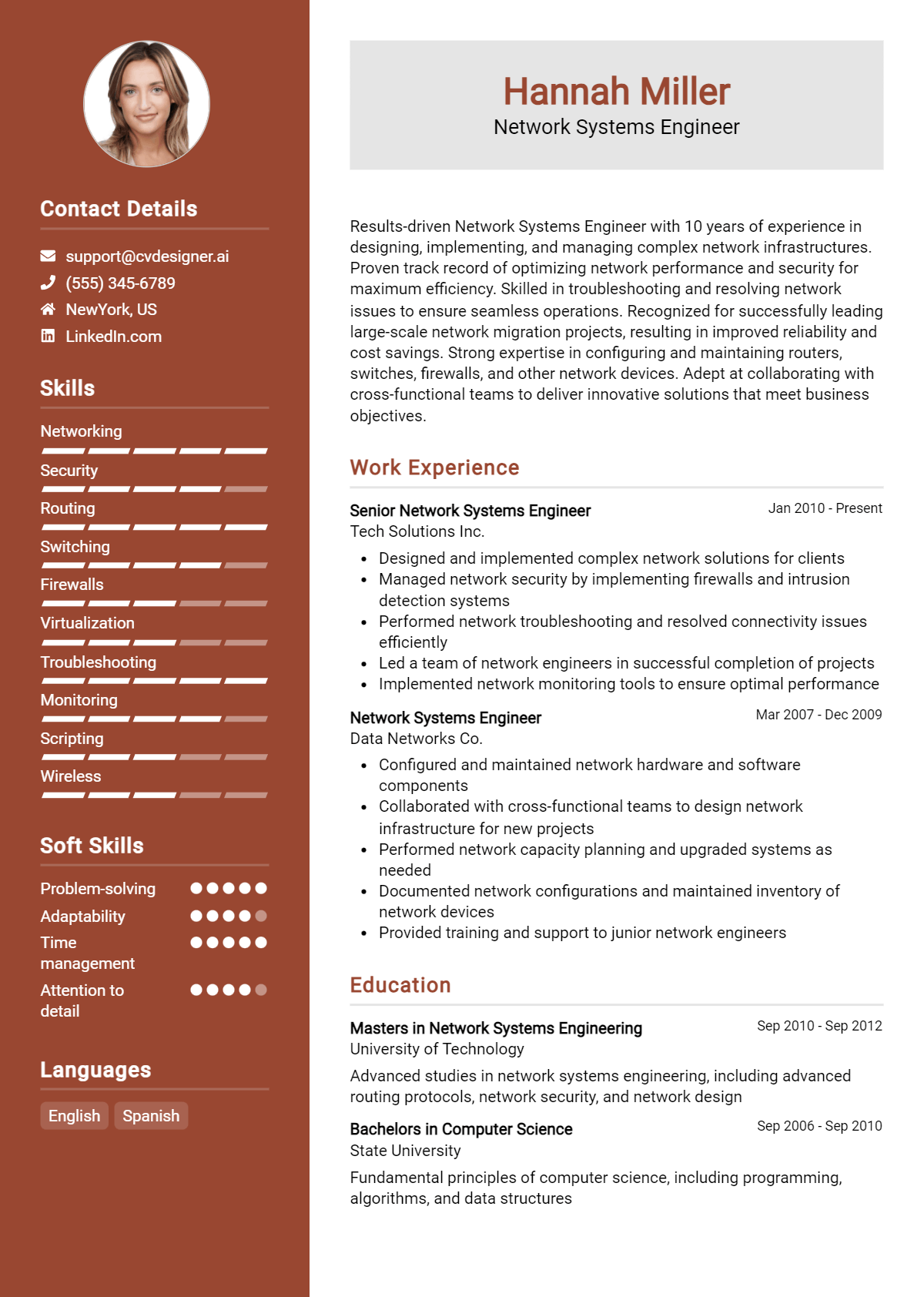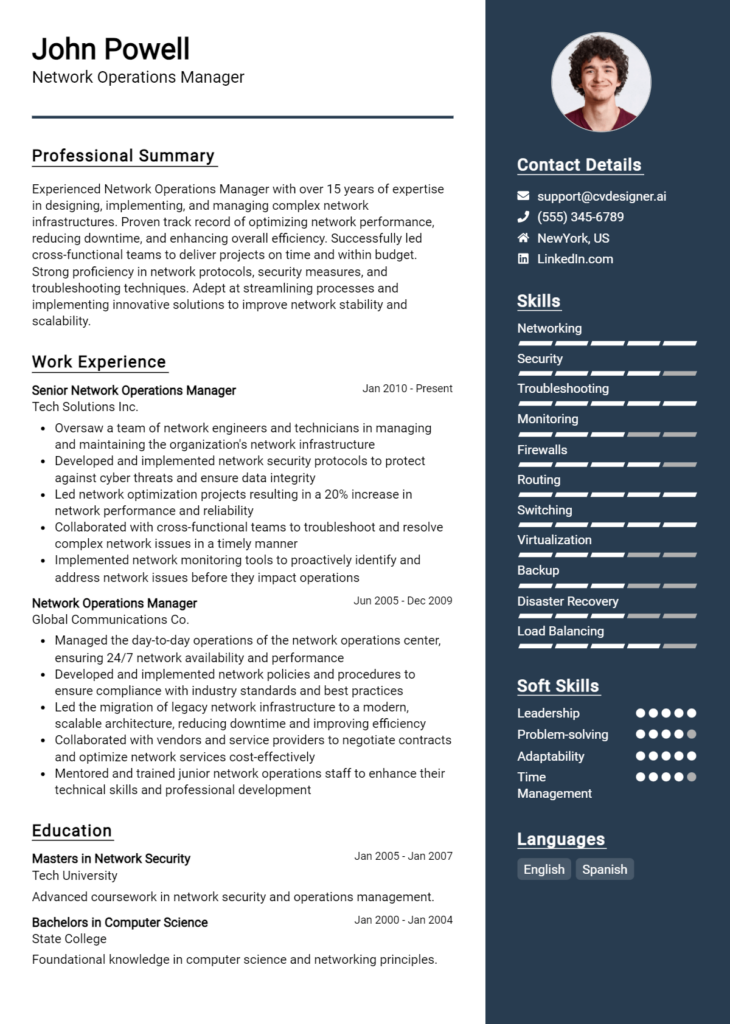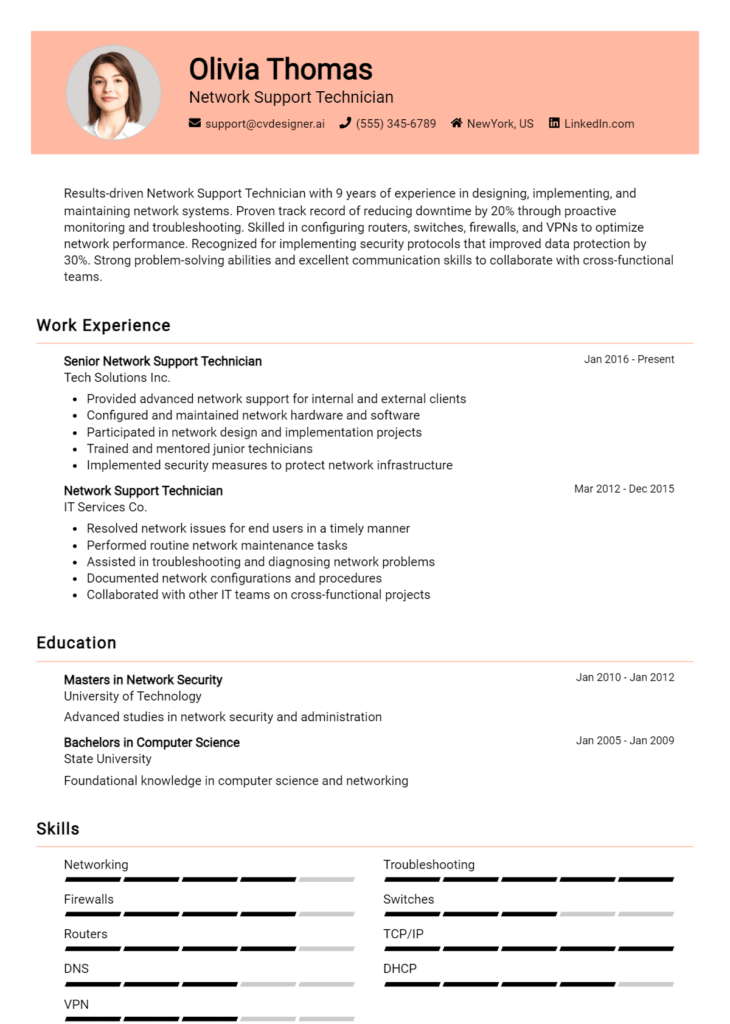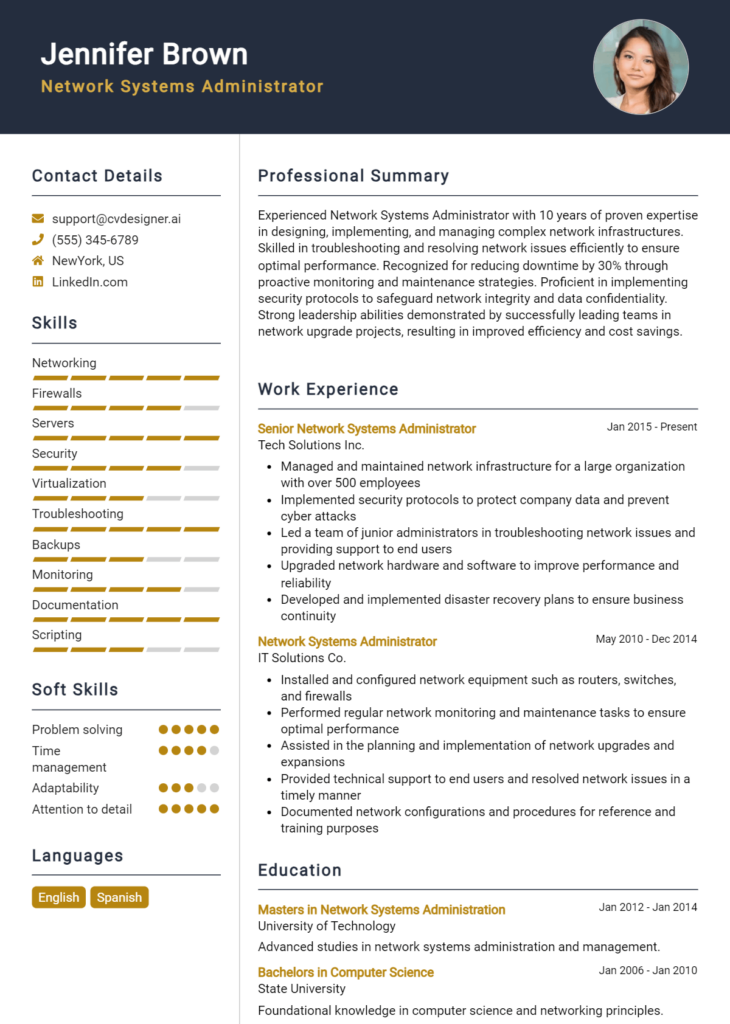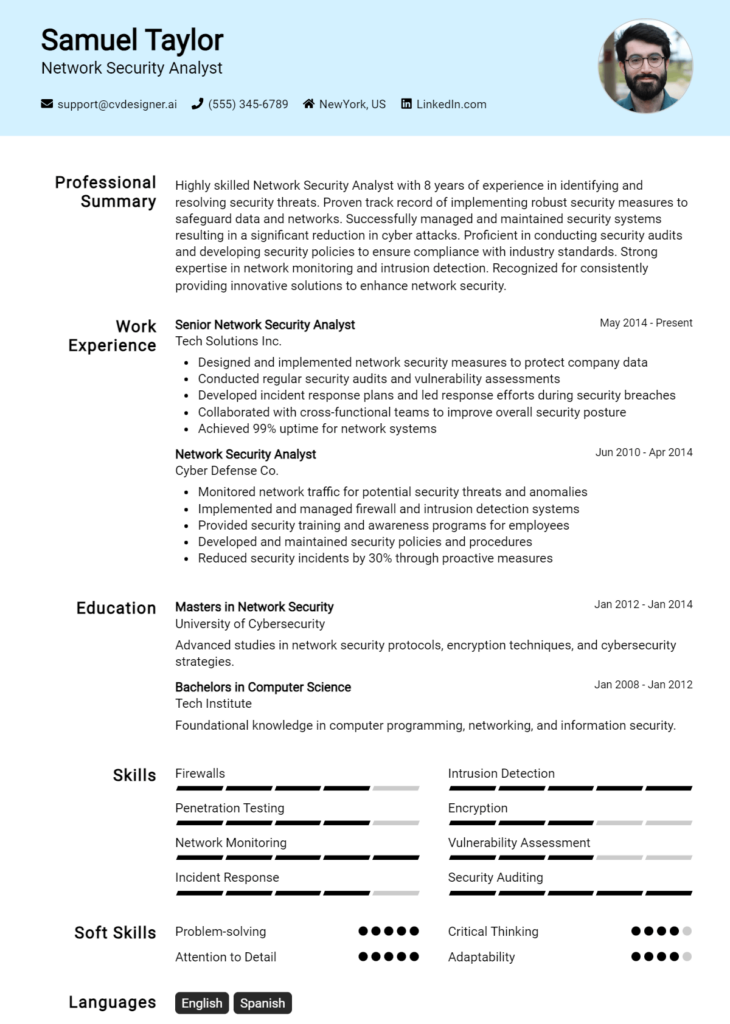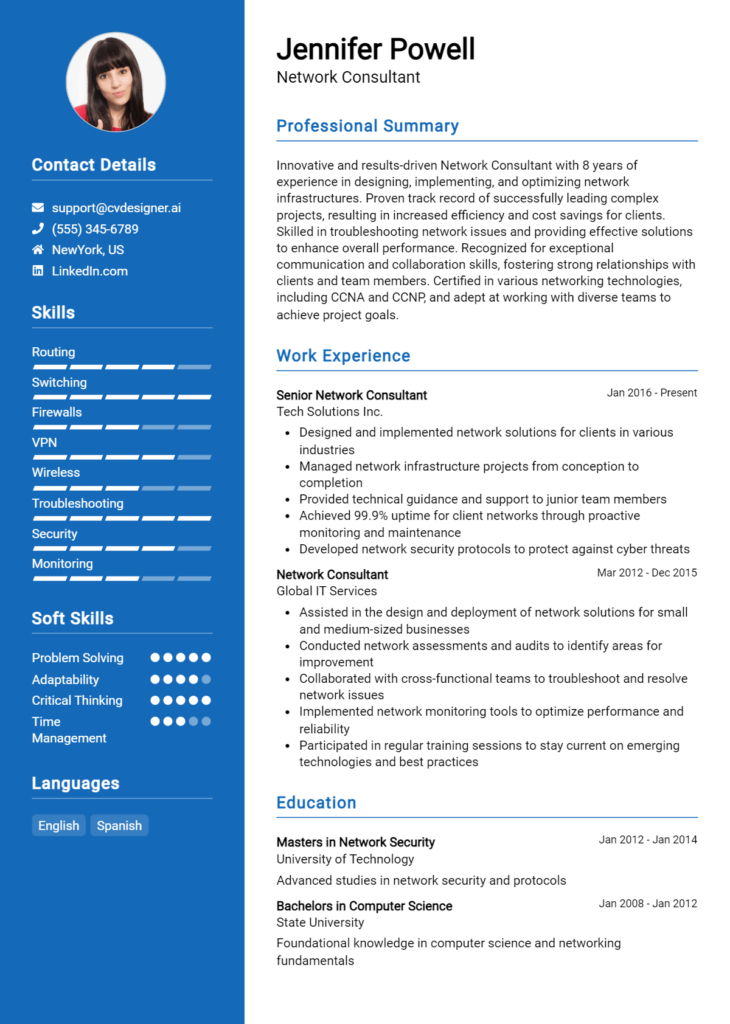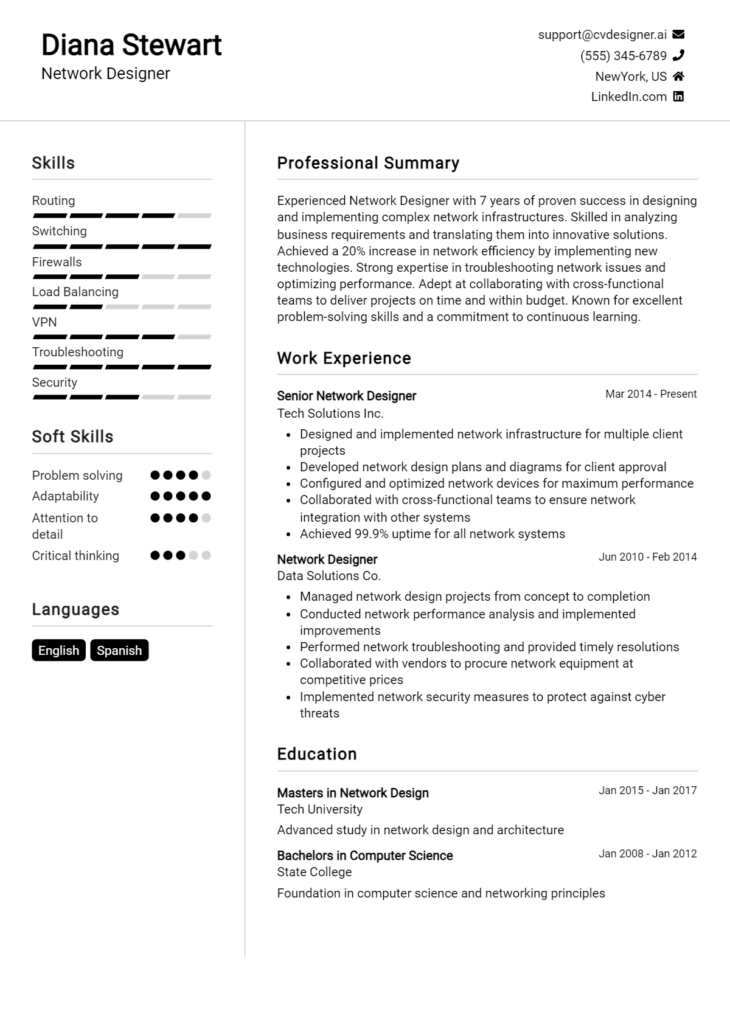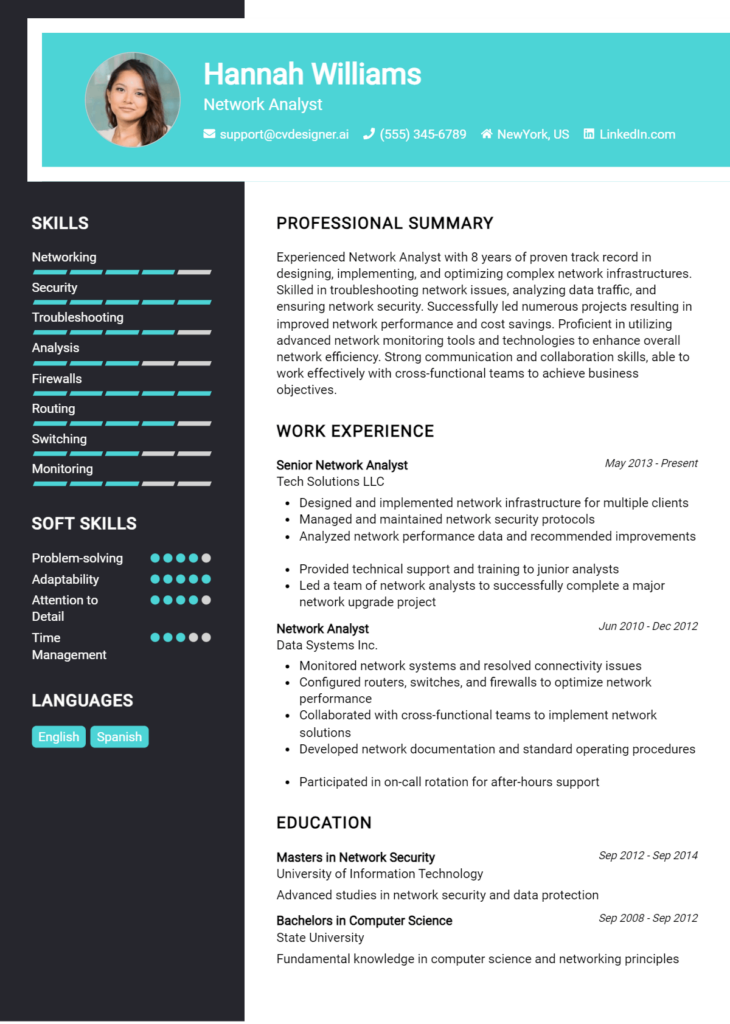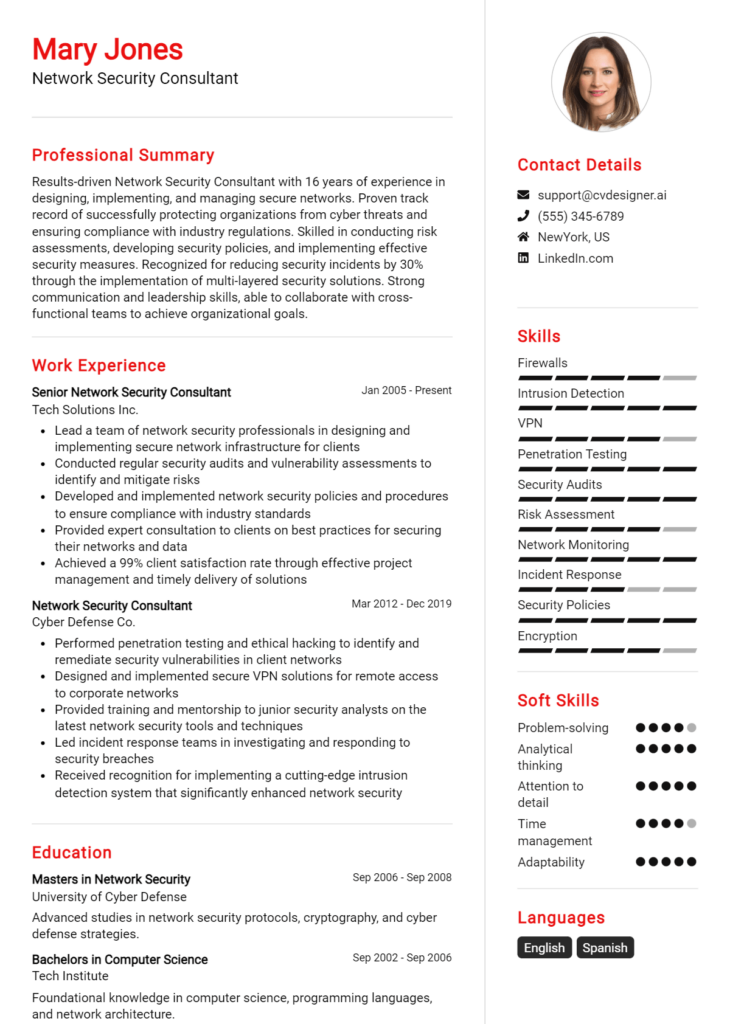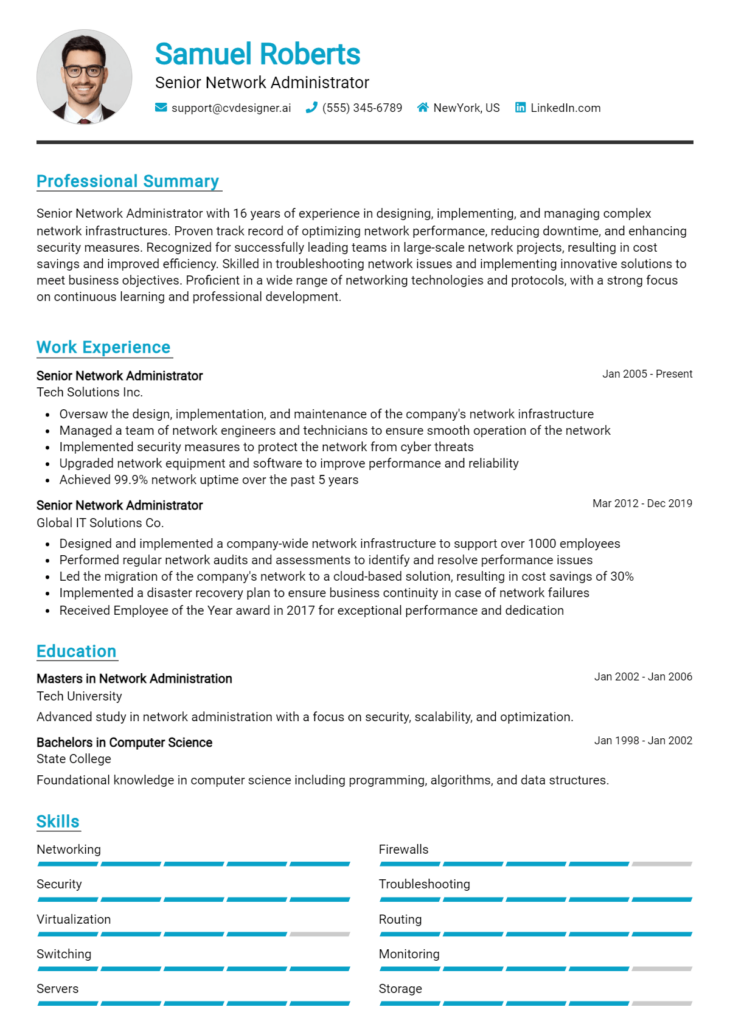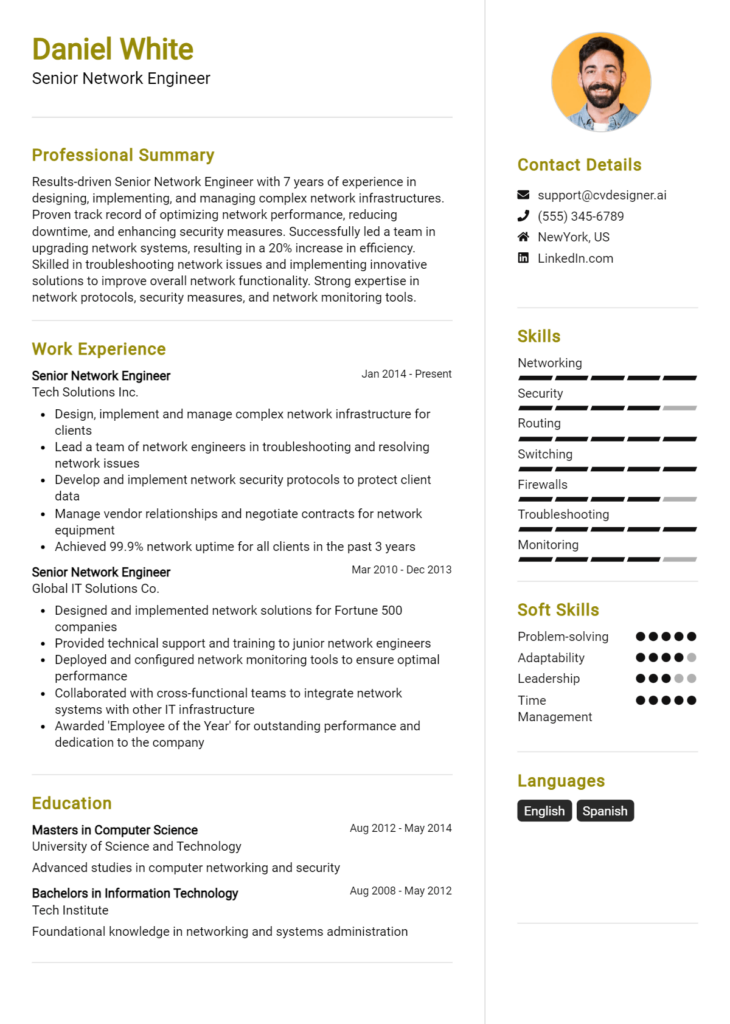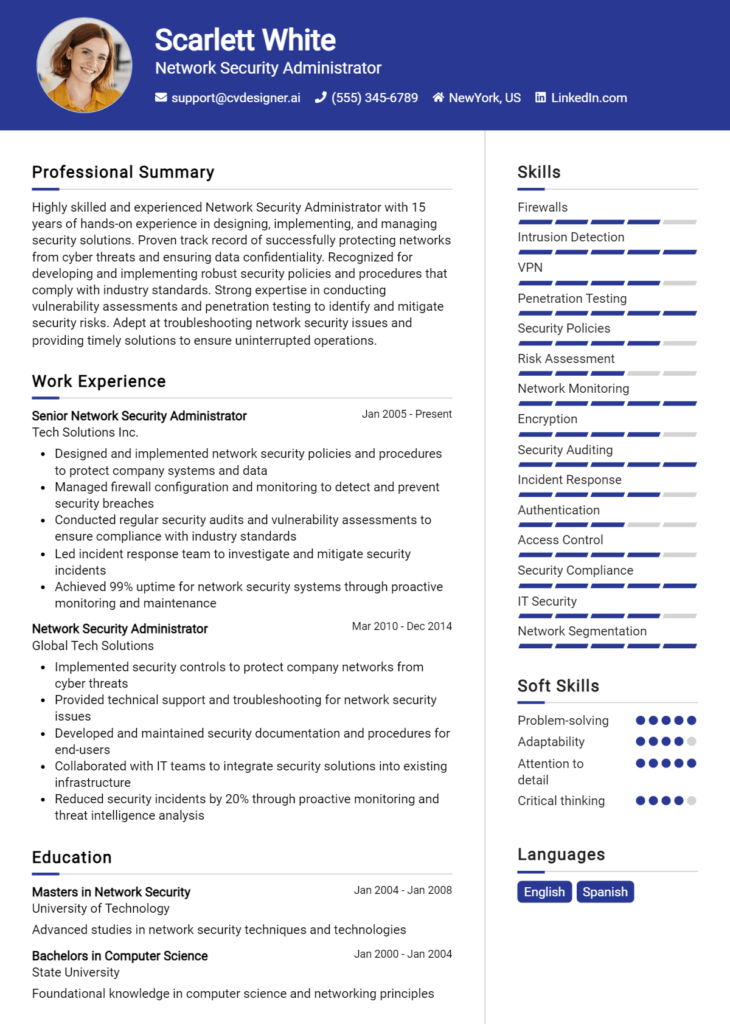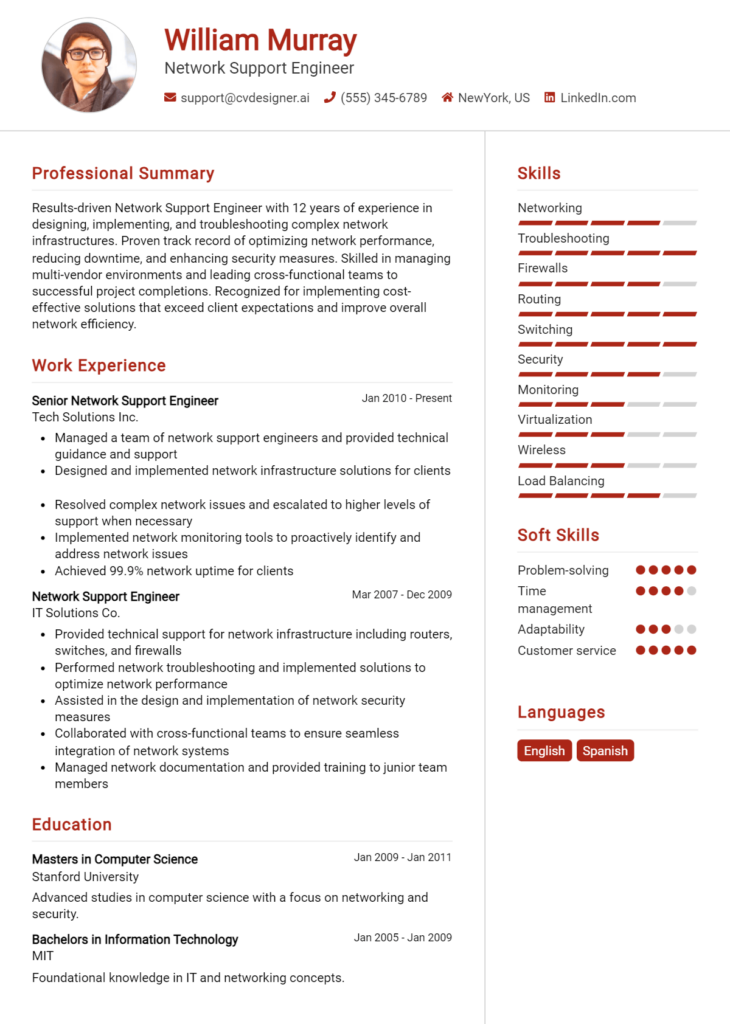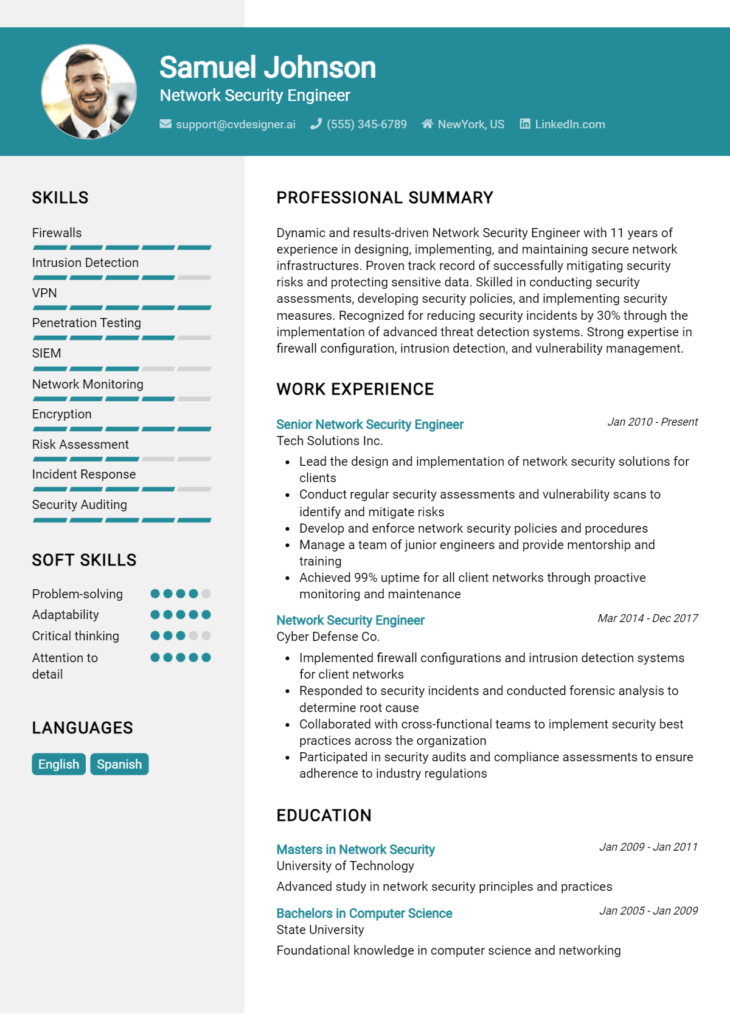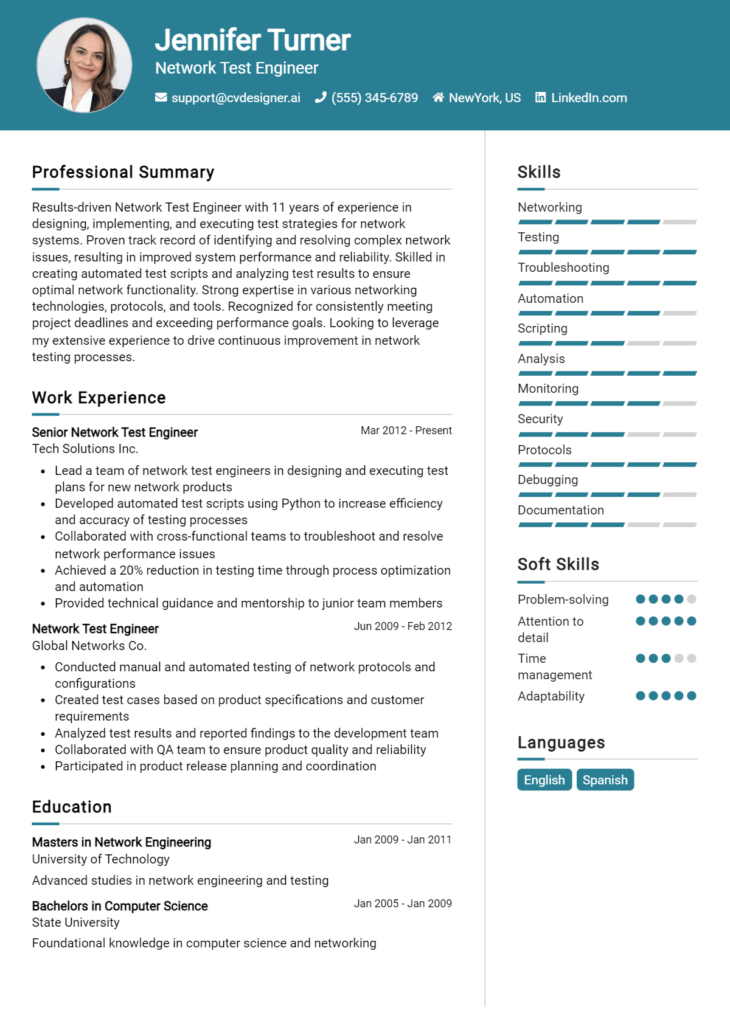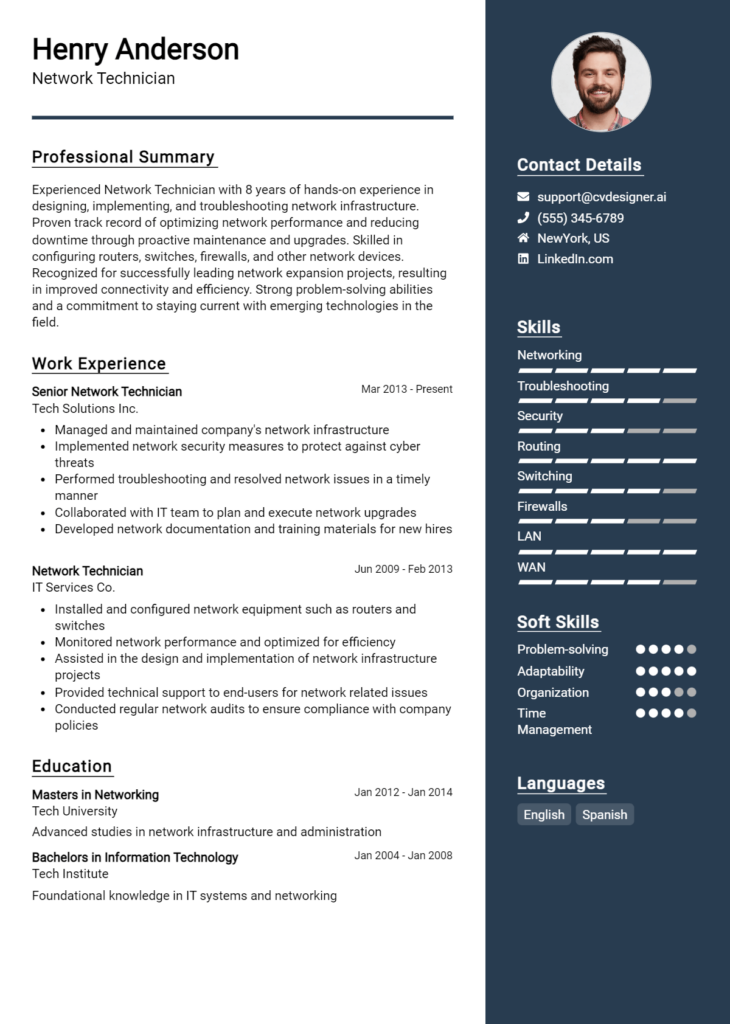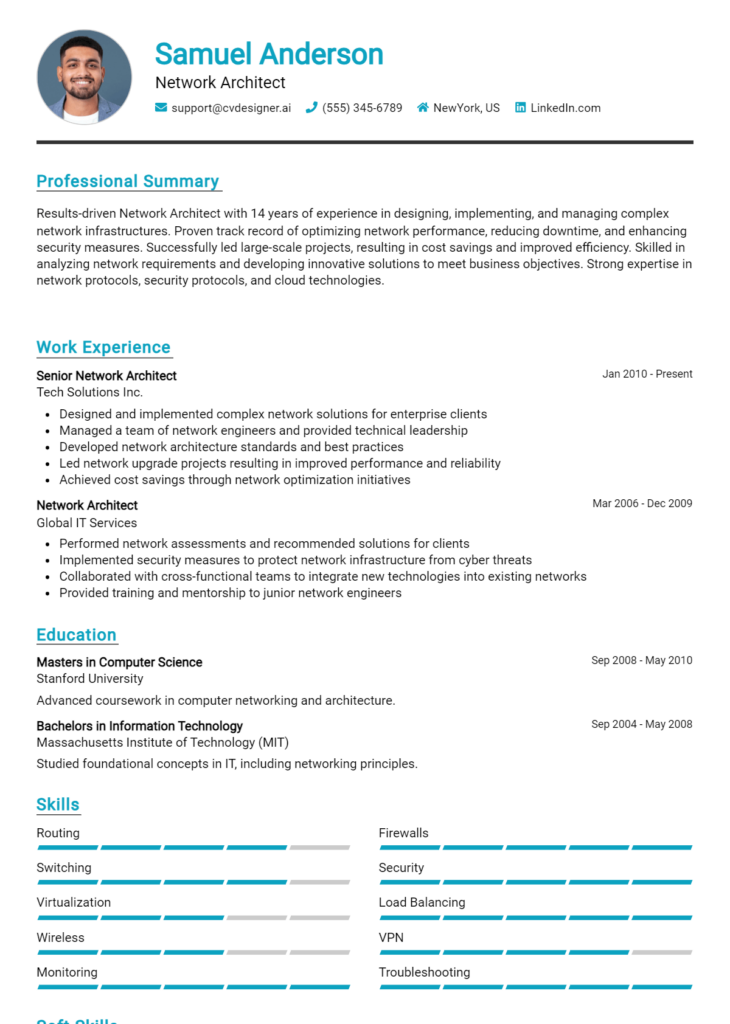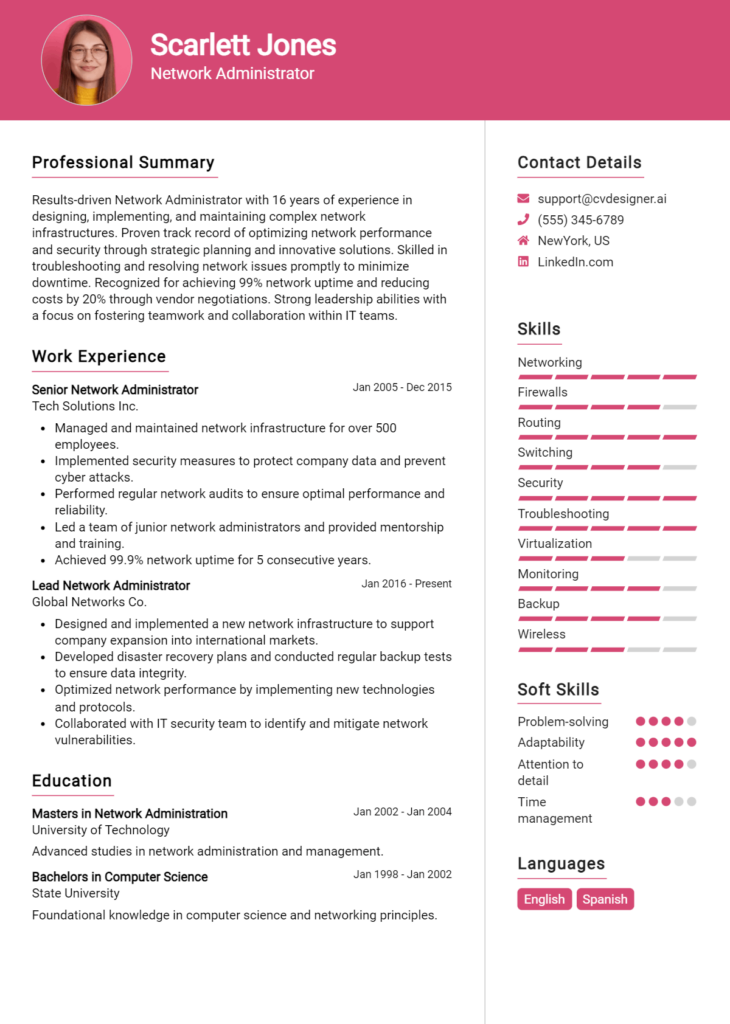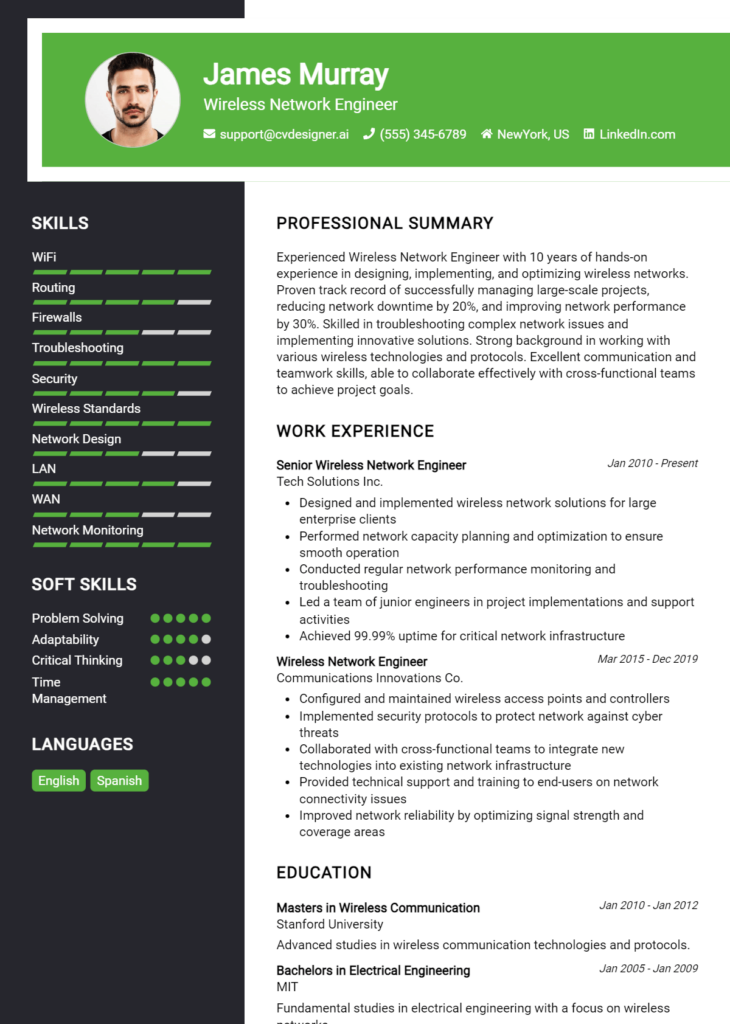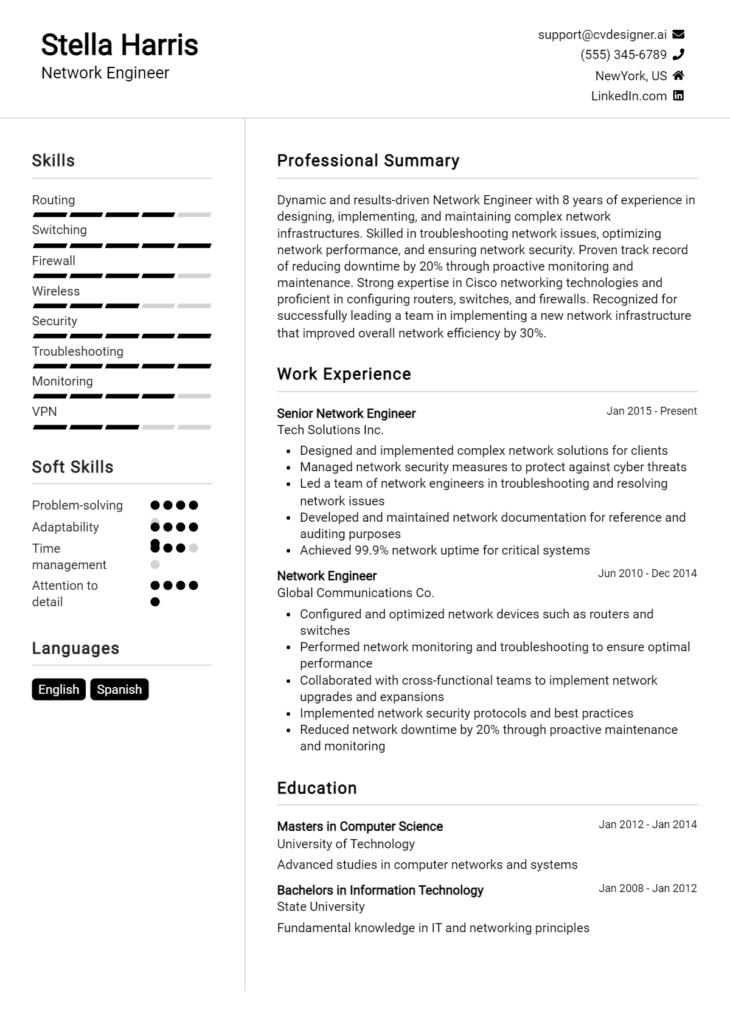Most Popular Network Systems Engineer Resume Examples
Explore additional Network Systems Engineer resume samples and guides and see what works for your level of experience or role.
As the digital landscape continues to evolve, the role of a Network Systems Engineer has become increasingly critical for organizations seeking to maintain robust and secure network infrastructures. These professionals are the backbone of any business's IT system, responsible for designing, implementing, and managing complex networks that facilitate seamless communication and data transfer. Given the high demand for skilled engineers in this field, a well-crafted resume is essential to stand out among the competition and showcase your technical prowess and problem-solving abilities. This article will guide you through the process of creating an impactful resume tailored specifically for Network Systems Engineers, ensuring that your qualifications and experience shine through.
In this comprehensive resume writing guide, we will cover several key points to help you craft the perfect resume. You'll learn about the primary responsibilities and skills expected of a Network Systems Engineer, enabling you to highlight your relevant expertise effectively. We will discuss the best formats to use, ensuring your resume is easy to read and visually appealing. Additionally, you'll discover common mistakes to avoid that could hinder your chances of securing an interview. To cater to professionals at various career stages, we will provide resume examples for entry-level, mid-level, and senior Network Systems Engineers. Lastly, we will share valuable tips on effective resume writing and selecting the right resume templates to help you make a lasting impression. With this guide, you'll be well-equipped to create a resume that not only showcases your technical abilities but also positions you as a top candidate in the competitive job market.
Key Responsibilities and Skills for a Network Systems Engineer
As a Network Systems Engineer, you play a crucial role in designing, implementing, and maintaining an organization’s network infrastructure. Your responsibilities typically include managing network equipment, optimizing performance, ensuring security, and troubleshooting connectivity issues. Collaborating with other IT professionals to integrate systems and improve overall network functionality is also key.
To excel in this role, it’s essential to possess a combination of technical expertise and problem-solving skills. Here are some of the key responsibilities and skills associated with the position:
Key Responsibilities:
- Design and implement network solutions that meet organizational needs.
- Monitor network performance and conduct regular maintenance.
- Troubleshoot and resolve network issues promptly.
- Ensure network security by implementing firewalls and other security measures.
- Collaborate with software and hardware teams to ensure seamless integration.
- Document network configurations and system changes.
- Stay updated with emerging technologies and industry best practices.
Essential Skills:
- Proficiency in networking protocols (TCP/IP, DNS, DHCP, etc.).
- Experience with routers, switches, and firewalls.
- Familiarity with network monitoring tools (e.g., Wireshark, SolarWinds).
- Strong analytical and problem-solving abilities.
- Knowledge of network security principles.
- Excellent communication and teamwork skills.
- Ability to work under pressure and manage multiple tasks effectively.
When crafting your resume, it’s vital to highlight these skills effectively in the resume skills section, ensuring they align with the specific job description you are applying for. Tailoring your responsibilities and skills to match the requirements of the job not only demonstrates your suitability but also increases your chances of standing out to potential employers. Moreover, consider how these skills could be relevant in creating a strong CV that showcases your qualifications and experience in network systems engineering.
Best Resume Format and Structure for a Network Systems Engineer
When crafting a resume for a Network Systems Engineer, it’s important to choose a format that clearly showcases your technical expertise, relevant experience, and educational background. The best resume format for this role is typically a combination format, as it allows you to highlight both your skills and your work history effectively. Below are key sections to include in your resume along with tips on how to structure them.
Contact Information
- Place your name at the top in a larger font.
- Include your phone number, email address, and LinkedIn profile (if applicable).
- Optionally, you can add your location (city and state) but avoid including a full address for privacy reasons.
Professional Summary
- Write a brief summary (2-4 sentences) that encapsulates your experience and value.
- Focus on your years of experience, key skills, and what you bring to potential employers.
- Tailor it to the job description by including relevant keywords and phrases.
Work Experience
- List your work experience in reverse chronological order, starting with your most recent job.
- For each position, include the job title, company name, location, and dates of employment.
- Use bullet points to describe your responsibilities and achievements, focusing on quantifiable results (e.g., "Improved network uptime by 20% through proactive monitoring").
- Highlight specific technologies and systems you’ve worked with, such as routers, switches, firewalls, VPNs, and cloud services.
Education
- List your degrees in reverse chronological order, including the degree earned, institution name, and graduation date.
- If you have a relevant certification or coursework that complements your degree, you may include it here.
Skills
- Create a dedicated section to showcase your technical skills, such as network protocols (TCP/IP, BGP), operating systems (Linux, Windows Server), and tools (Wireshark, Cisco IOS).
- Consider grouping skills into categories like Networking, Security, and Cloud Technologies for clarity.
Certifications
- List any relevant certifications, such as Cisco Certified Network Associate (CCNA), CompTIA Network+, or Certified Information Systems Security Professional (CISSP).
- Include the certifying body and the date obtained. If you are working towards a certification, indicate that as well.
Additional Sections (Optional)
- Projects: If applicable, describe significant projects you’ve worked on that demonstrate your skills and experience.
- Professional Affiliations: Mention any professional organizations you belong to, such as IEEE or local networking groups.
- Volunteer Experience: If you have relevant volunteer work that complements your skills, include it.
Tips for Formatting Your Resume
- Use clear headings and subheadings to guide the reader through your resume.
- Choose a clean, professional font (like Arial or Calibri) and keep the font size between 10-12 points.
- Maintain consistent formatting with bullet points, margins, and spacing to ensure readability.
- Limit your resume to one or two pages, focusing on the most relevant information.
A well-structured resume will complement your cover letter effectively. Your cover letter should expand on the skills and experiences highlighted in your resume, providing context and narrative about your career journey. Use a matching format and design for both documents to create a cohesive and professional application package. This attention to detail will present you as a serious candidate and demonstrate your commitment to quality work.
Writing Tips and Best Practices for a Network Systems Engineer Resume
When crafting a resume as a Network Systems Engineer, it's essential to highlight both your technical proficiency and problem-solving skills in a clear, concise manner. Tailor your resume to the specific job description, ensuring that your experience and qualifications align with the needs of the employer. Use action verbs to initiate bullet points and reflect your contributions effectively. Quantifying your achievements helps potential employers understand the impact of your work, while incorporating industry-specific keywords can enhance the visibility of your resume in applicant tracking systems. For a polished and professional look, consider utilizing resume writing tips. Additionally, remember that many of these practices are just as relevant when drafting a cover letter.
- Use action verbs like "engineered," "implemented," and "optimized" to describe your experience.
- Quantify your achievements with specific metrics, such as “reduced network downtime by 30%” or “managed a team of 5 engineers.”
- Incorporate industry-specific keywords and phrases that align with the job description, such as "network architecture," "firewall configuration," or "VPN solutions."
- Keep the formatting consistent and easy to read, using bullet points and clear section headings.
- Limit your resume to one or two pages, focusing on relevant experience and skills.
- Highlight certifications such as CCNA, CCNP, or CompTIA Network+, as these are critical in the networking field.
- Tailor your resume for each job application, emphasizing the most relevant skills and experiences for that specific role.
- Proofread for grammatical errors and typos to ensure professionalism and attention to detail.
Common Mistakes to Avoid in a Network Systems Engineer Resume
When crafting a resume for a Network Systems Engineer position, it’s crucial to present your skills and experience effectively. Many candidates make common mistakes that can detract from their qualifications and hinder their chances of landing an interview. By avoiding these pitfalls, you can enhance the clarity and impact of your resume, making it stand out to hiring managers. Below are some common mistakes to watch out for:
- Overloading the resume with excessive technical jargon that may not be easily understood by non-technical recruiters.
- Using generic descriptions that fail to highlight specific achievements or contributions in previous roles.
- Failing to tailor the resume for each job application, leading to a one-size-fits-all approach.
- Listing responsibilities rather than accomplishments, missing the opportunity to showcase measurable results.
- Ignoring the importance of formatting and organization, which can make the resume difficult to read.
- Overusing buzzwords without providing context or evidence to back them up.
- Neglecting to include relevant certifications or training that are significant in the field of network engineering.
- Omitting soft skills that are essential for teamwork and communication within IT environments.
- Including outdated or irrelevant work experience that does not pertain to the role being applied for.
For more detailed insights into common mistakes to avoid, consider reviewing the common mistakes to avoid in a resume. Additionally, don’t forget to check out the common cover letter mistakes that should also be avoided to ensure a comprehensive application package.
Sample Network Systems Engineer Resumes
As a Network Systems Engineer, you play a critical role in designing, implementing, and maintaining an organization's network infrastructure. Whether you're an experienced professional, an entry-level candidate, or someone transitioning from another career, having a well-crafted resume is essential to showcase your skills and achievements. Below, you will find three full-length sample resumes tailored to different experience levels, which can serve as inspiration for your own application. For more ideas, feel free to explore additional resume templates. Additionally, consider reviewing corresponding cover letter examples to complete your job application package.
Experienced Network Systems Engineer Resume
John Doe
123 Main St, Anytown, USA 12345
(123) 456-7890 | johndoe@email.com
Professional Summary
Detail-oriented Network Systems Engineer with over 8 years of experience in designing, implementing, and managing complex network infrastructures. Proficient in network security protocols, troubleshooting, and performance optimization. Committed to delivering high-quality solutions that enhance operational efficiency and ensure network reliability.
Skills
- Network Design & Implementation
- Cisco & Juniper Technologies
- Firewall Configuration & Management
- Network Security & Monitoring
- Performance Tuning
- Troubleshooting & Problem Resolution
- Project Management
- Team Leadership
Professional Experience
Senior Network Systems Engineer
XYZ Corporation, Anytown, USA
June 2018 - Present
- Lead the design and implementation of a multi-site network infrastructure, enhancing connectivity and redundancy.
- Collaborate with cross-functional teams to develop and enforce network security policies, reducing vulnerabilities by 30%.
- Oversee network performance monitoring and troubleshooting, achieving a 99.9% uptime rate.
- Manage a team of junior engineers, providing mentorship and training on best practices.
Network Systems Engineer
ABC Tech, Anytown, USA
January 2015 - May 2018
- Designed and deployed a corporate VPN solution that increased remote access security.
- Conducted regular network assessments and audits, leading to proactive adjustments that improved network speed by 25%.
- Assisted in the migration of legacy systems to a cloud-based infrastructure, reducing operational costs by 20%.
Education
Bachelor of Science in Computer Networking
University of Technology, Anytown, USA
Graduated: May 2014
Entry-Level Network Systems Engineer Resume
Jane Smith
456 Oak St, Anytown, USA 67890
(987) 654-3210 | janesmith@email.com
Professional Summary
Motivated and detail-oriented recent graduate with a Bachelor’s degree in Computer Networking. Eager to apply theoretical knowledge and hands-on experience in a dynamic network engineering role. Strong skills in troubleshooting, network design, and customer service.
Skills
- Basic Networking Concepts
- Cisco Certified Network Associate (CCNA)
- Troubleshooting Techniques
- Windows & Linux Server Administration
- TCP/IP Protocol Suite
- Excellent Communication Skills
- Team Collaboration
Education
Bachelor of Science in Computer Networking
University of Technology, Anytown, USA
Graduated: May 2023
Internship Experience
Network Engineering Intern
Tech Solutions, Anytown, USA
June 2022 - August 2022
- Assisted in the configuration and troubleshooting of network devices, including routers and switches.
- Supported the team in conducting network performance assessments and implementing upgrades.
- Gained hands-on experience with network monitoring tools and protocols.
Projects
- Developed a network design proposal for a fictional company as part of a senior project, incorporating best practices in security and reliability.
Career Changer Network Systems Engineer Resume
Michael Brown
789 Pine St, Anytown, USA 23456
(654) 321-0987 | michaelbrown@email.com
Professional Summary
Dedicated professional transitioning from a career in IT support to Network Systems Engineering. Leveraging extensive experience in technical support and customer service to drive effective network solutions. Possesses strong analytical skills and a passion for technology.
Skills
- Network Troubleshooting
- IT Support & Customer Service
- Cisco & Network Fundamentals
- Problem-Solving Skills
- Technical Documentation
- Team Collaboration
- Time Management
Professional Experience
IT Support Specialist
Support Services Inc., Anytown, USA
June 2018 - Present
- Provided technical support for network-related issues, resolving over 95% of inquiries on the first call.
- Collaborated with network engineers to identify and troubleshoot network performance issues.
- Conducted training sessions for clients on network best practices and security measures.
Education
Cisco Certified Network Associate (CCNA)
Network Training Academy, Anytown, USA
Completed: September 2023
Certifications
- CompTIA A+
- CompTIA Network+
Explore more resume templates for inspiration, and don't forget to check out corresponding cover letter examples to create a complete job application package.
Checklist for a Network Systems Engineer Resume
- Proofread for Typos and Grammatical Errors: Carefully read through your resume to catch any spelling or grammatical mistakes. Consider using a spell checker or grammar checking tool for additional support.
- Check Consistency in Formatting: Ensure that font types, sizes, and styles are consistent throughout the document. Use the same bullet points or numbering style for similar sections.
- Tailor Your Resume for Each Job Application: Customize your resume by including specific keywords and phrases from the job description. Highlight relevant experiences and skills that match the requirements of the position.
- Highlight Relevant Technical Skills: Make sure to emphasize technical skills that are crucial for a Network Systems Engineer, such as networking protocols, security systems, and cloud services.
- Quantify Your Achievements: Where possible, use numbers to demonstrate your impact. For example, state how much you improved network efficiency or reduced downtime.
- Include Relevant Certifications: List any professional certifications that are pertinent to the role, such as CCNA, CCNP, or CompTIA Network+, to validate your expertise.
- Ensure Clear and Concise Language: Use straightforward language and bullet points to make your qualifications easy to read and understand. Avoid jargon or overly complex terminology.
- Check for a Professional Email Address: Make sure your contact information includes a professional email address, ideally one that includes your name.
- Use an AI Resume Builder for Organization: Consider using an AI resume builder to help structure your resume effectively and ensure all elements are well-organized.
- Follow a Similar Checklist for Other Documents: Remember, a similar checklist can be applied when creating a CV or a cover letter to maintain professionalism across all your job application materials.
Key Takeaways for a Network Systems Engineer Resume Guide
In conclusion, creating a strong resume as a Network Systems Engineer is essential for standing out in a competitive job market. Utilize the examples and tips provided to highlight your skills, experiences, and accomplishments effectively. As a next step, consider downloading a professionally designed template from resume templates or crafting an impactful cover letter using our cover letter templates. For a more personalized touch, try our best resume maker to ensure your resume meets industry standards. Additionally, following similar guidelines will aid you in crafting a compelling CV and an engaging cover letter. Take these steps to enhance your application and increase your chances of landing that desired position!
